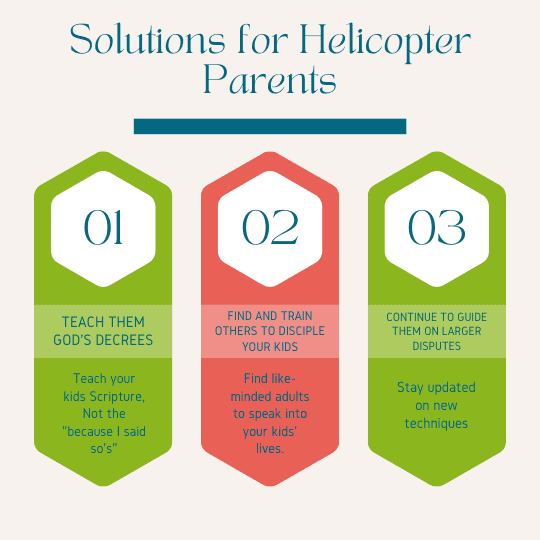
How To Talk to Your Kids About the News
The news can often terrify children. As a parent, you can help your kids sort through news stories they might see on TV.

I know you’ve heard the term ‘helicopter parent.’ Are you one of them? If so, here are some solutions to avoiding helicopter parenting.
Estimated reading time: 6 minutes
I know you’ve heard the term helicopter parent.
Are you one of them?
I like to think I’m not because I often let my kids fly their own planes. However, I can’t say that I don’t hover over them in a few areas. Actually, in several.
I want to compare the helicopter parenting style to Moses from the Bible. You may think— Moses? I feel like I already know all there is to know about him.
What else is there to know about Moses? Here’s one: he was a helicopter leader. Let me give you some background.
After Pharaoh let God’s people go from slavery, the long journey began for Moses. He was their new leader.
With that newly assigned leadership role, Moses inherited many responsibilities. The Israelites brought every single issue to him. They complained because they had no food… no water… everyone was going to die… all the animals were going to die… they constantly questioned why God would free them from Pharaoh’s power if they were just to die in the desert anyway (Exodus 17:3).
When people brought their requests to Moses, he always went to God for answers. God, in His infinite love and wisdom, would instruct Moses on what to do or say to the people each time.
Jethro was Moses’ father-in-law and was not in the desert during the Israelites’ journey. He didn’t see their daily needs and wasn’t a part of the various miracles God had been performing.
In fact, Moses sent his wife and two sons to stay with Jethro while he handled the Israelites in the desert.
In Exodus 18, Jethro went to visit Moses. Others had shared with him about everything Moses had been doing for the people, but for the first time, he actually saw it all for himself.
In other words, he brought an outsider’s perspective from someone who had not been alongside the long journey day in and day out.
Exodus 18:4 says, “when Moses’ father-in-law saw all that Moses was doing for the people, he asked, “What are you really accomplishing here? Why are you trying to do all this alone while everyone stands around you from morning till evening?””
Jethro quickly recognized Moses was doing a lot for the Israelites.
“Moses replied, “Because the people come to me to get a ruling from God. When a dispute arises, they come to me, and I am the one who settles the case between the quarreling parties. I inform the people of God’s decrees and give them his instructions.”” (Exodus 18:15-16)
Moses had a valid point: the people needed him. The people trusted the solution he provided every time because it came directly from God.
However, Moses believed the people wouldn’t be able to solve anything without his help, advice, and problem-solving ability. He carried all the pressure upon his shoulders because he had received instructions to lead God’s people into freedom.
If we analyze many parentings styles, we would find there are some parents who resemble Moses’ helicopter leadership approach.
Parents intervene when siblings are fighting. Parents pick up the phone the second a child comes home with a complaint about a teacher. Child not getting enough playing time on the team? Time for the parent to have a talk with the coach. Drama with a friend? Oh, of course the parent is getting involved.
Some parents suffocate their children, others lack in training them to face adversities in the process of wanting to protect them.
After Moses answered the question about why he was trying to do everything for the Israelites, Jethro responded, “This is not good! You’re going to wear yourself out—and the people, too. This job is too heavy a burden for you to handle all by yourself.”
He proceeded to suggest three things to Moses:

Jethro knew that if Moses continued solving every little thing for the Israelites, he would hit burnout. He wouldn’t be the leader God intended him to be. He also knew the job was too large for one person to do alone.
We know parenting is extremely rewarding. We can’t deny that it’s also quite exhausting.
So, what can we learn from Jethro’s leadership advice to Moses?
Children must be taught how to handle issues. They need to know how God wants them to be slow to anger, loving to their neighbor, forgiving to those who have hurt them. That includes an argument with a group member at school as well as their sibling.
Teach them scripture. God’s decrees. Not the “because I said so’s.” Tell them why we turn the other cheek, choose kindness, and are merciful—because of Jesus’ sacrifice for us. Next, teach them that we love—because God loved us first with the most perfect and selfless love known in the history of the world. Finally, teach them that He chose you to be their parents—because He knit them beautifully and perfectly in their mother’s womb.
Find other adults that are likeminded and can speak into your kids’ lives. “Train” them by giving them permission to give advice and correct your children when necessary. Take advantage of partnerships with others you trust—you can’t be everywhere your child is at all times!
Help your child realize who you’ve given permission to “parent” them. Guide your child to learn who their spiritual parents are, who their cool uncle is, and who has a super comfortable couch to talk about heartaches.
It’s likely that your children won’t want to share certain things with you, even if you have the closest relationship! This is where those other leaders in their lives will be extra valuable.
Jethro didn’t tell Moses to give up control altogether. He knew that certain disputes would require Moses’ expertise as well as closeness with the Lord.
Remain the primary decision maker in handling the larger disputes your children face. You’re the main disciplinarian—ensure you remain that way.
Set the boundaries and stay consistent in how you handle the larger disputes. Define those disputes, know the standards you want your kids to abide by, and communicate with your kids often about various topics.
Avoid only having heart-to-heart conversations after they’ve messed up and need discipline. Have fun with them! Take them on dates! Make sure they feel your love during the good times as well as the tougher ones.
And take Jethro’s advice: share the load. Don’t be a helicopter parent hovering over your children’s every single move. You’ll run out of fuel.